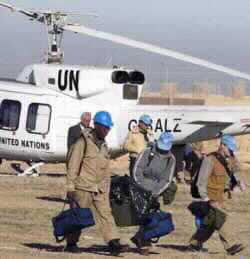Bad weather forced U.N. weapons inspectors to abandon aerial searches of suspect sites in Iraq on Thursday, but experts on the ground pushed ahead with a hunt for alleged weapons of mass destruction. The searches came hours before chief inspectors were due to give the Security Council a more detailed analysis of Baghdad's arms declaration and an initial assessment of the inspections.
Iraqi Vice President Taha Yassin Ramadan reiterated on Thursday the inspectors were involved in intelligence work that had nothing to do with weapons of mass destruction.
"We hope that they avoid and stop this...because we know there is pressure and demand even for the type of questions (they ask) from the American administration," he said in an interview with the London-based Middle East Broadcasting Coorporation.
Witnesses said three U.N. helicopters carrying inspectors had to turn back to Baghdad due to bad weather conditions over northwestern Iraq. The aircraft, accompanied by two Iraqi helicopters, had flown for about an hour.
Other experts from the U.N. Monitoring, Verification and Inspection Commission (UNMOVIC) and the International Atomic Energy Agency (IAEA) drove to at least seven sites in central Iraq, Iraqi officials said. UNMOVIC missile teams went to three sites: Al Rifah facility in Baghdad, Al Hareth in Taji, nine miles north of Baghdad and Al Milad in Yousefiyah, 12 miles south. Chemical teams went to Al Rayah facility in Taji and Ayniyah in Beji, 112 miles north of the capital.
A biological team visited a medical laboratory in Baghdad while an IAEA team went to Al Qadisiyah facility northeast of the capital.
SECURITY COUNCIL BRIEFING
Chief weapons inspector Hans Blix and Mohamed ElBaradei of the IAEA were to brief the U.N. Security Council later on Thursday on Iraq's 12,000-page weapons declaration, submitted a month ago. A fuller report on the inspectors' work is scheduled for January 27.
Amir al-Saadi, senior adviser to President Saddam Hussein , said Iraq expected the inspectors to say they needed more time but inspections so far showed Baghdad had told the truth about its programs.
Asked if Baghdad would continue to cooperate with the inspectors, Ramadan said:
"We will exert our efforts but I say for the work to continue to its conclusion and be accomplished in the shortest time, we hope these teams bypass the American pressures and carry out their job in a professional and precise manner.
The inspectors began their latest work in Iraq based on a November U.N. resolution that threatened Iraq with serious consequences if it failed to cooperate.
An official Iraqi daily challenged the United States to provide inspectors with intelligence on alleged banned weapons, saying Washington and London had formed an "axis of deception."
Secretary of State Colin Powell said in an interview published on Thursday Washington was sharing intelligence on Iraqi weapons programs with U.N. arms experts but continues to withhold some of its most sensitive information.
The information, provided within the past several days, has enabled U.N. inspectors hunting for banned weapons in Iraq to be "more aggressive and to be more comprehensive" in their job, Powell told The Washington Post.
Al-Thawra said in its front-page editorial such intelligence did not exist.
"Therefore, we challenge the deceivers in Washington and London to present any tip or lead that proves what they claim against Iraq," it said. "Will they do that or they will be satisfied with telling lies irresponsibly and without shame?"
Blix and ElBaradei are expected to visit Baghdad next week, before they report back to Security Council on January 27. That report is widely seen as possible showdown time for war if Iraq fails to satisfy the weapons inspectors.
PHOTO CAPTION
United Nations experts make their way towards the al-Qaim phosphate plant, 249 miles east of the capital Baghdad, close to the border with Syria January 7, 2003. The experts hunting for Iraq's alleged weapons of mass destruction used helicopters for the first time to reach their destination since launching inspections last November 27. (Pool via Reuter
- Author:
& News Agencies - Section:
WORLD HEADLINES


 Home
Home Discover Islam
Discover Islam Quran Recitations
Quran Recitations Lectures
Lectures
 Fatwa
Fatwa Articles
Articles Fiqh
Fiqh E-Books
E-Books Boys & Girls
Boys & Girls  Hajj Rulings
Hajj Rulings Hajj Fatwas
Hajj Fatwas














